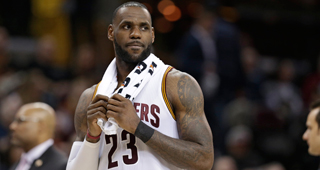LeBron’s Cavaliers Mark II are a fragile bunch. Their championship wasn’t some shortcoming-obliterating threshold traversal so much as it was them masking their frailties long enough to beat a 73-win juggernaut. This isn’t faint praise: they were awesome last June, but there was then and continues to be now a sense about them, even as they’re soaring, that they might pop off a ball-bearing and end up smoking in a ravine. This is true of a lot of great-if-not-historically-great teams: they lack inevitability, so everything they do can be perceived as the next step of their demise. Add to that LeBron James qua cosmically strange guy, qua mythology sponge. His eyebrow twitches in an unexpected direction after a defensive breakdown and we think it means something. All of this makes the Cavs hard to read beyond a certain poorly hidden unsteadiness. They’re good for one meltdown and a couple lesser skids per year. They are also, on their day, the best team in the league.
Or they were, at any rate, before that 73-win juggernaut added Kevin Durant. Now everything’s theoretical again, but we’re all moderately sure the Warriors have the edge, considering they might have the best starting five of all-time. And the Cavs, as their defensive numbers have flagged over the back half of the NBA calendar, have either been regressing or taking their sweet time snapping out of a slump. It’s legitimately impossible to tell with them.
Regardless of what they do going forward, overall, it’s been an inordinately tough year for the Cavaliers. J.R. Smith broke his thumb in December and spent most of his winter-long rehab stint away from the team to look after his infant daughter, who was born five months premature. It’s not surprising he has shot a smidgen below 34 percent from three-point range since returning in mid-March. After losing the usefully pesky Matthew Dellavedova last offseason, the Cavs lacked a backup point guard for most of the season. They’ve slotted buyout pickup old dog Deron Williams into that slot, and though D-Will still has some playmaking left in him, he’s yet another creaky defender among a roster full of them. Iman Shumpert’s three-point stroke was serviceable through March but it has abandoned him in the spring. Playing or sitting him is a choice between shoring up the team’s perimeter defense and spacing the floor on offense. He was cut out of the rotation for Game One of the Cavs’ first round series against the Pacers and clocked 20 minutes in Game 2 only because Smith picked up a hamstring injury in the contest’s first half.
Kevin Love, outside of an extended injury layoff in February and March, has had a fine season but his mere Very Goodness is as much of a problem as it has ever been. There’s an argument to be had about whether Love was truly MVP-caliber in Minnesota but lingering back issues throughout his Cavs tenure have rendered it moot. He arrived as damaged goods and though he has phenomenal utility as a spot-up shooter, rebounder, and passer, he’s a defensive liability and fluctuates unpredictably between meaty effectiveness and ball-bobbling schmuckery in the post. This is a harsh thing to say about a player who can put up 27 points and 11 rebounds in a playoff game, as he did this past Monday night, but there’s something about Love’s game that’s self-conscious and unconvincing. Like he’s going to biff it if the moment gets too big, or a fly lands on his shoulder. And not for nothing, the Warriors, specifically, turn him into a bit player who can’t play many minutes because no one on the floor is guardable for him. Love has just never been what the Cavs had in mind when they traded for him. That they won a title without him looking nearly as dominant as he was with the Wolves speaks to his weird semi-superfluousness.
Beyond those issues, nearly every other player on the Cavs roster, no matter their talent level, carries the caveat ...but they’re a pretty bad defender. They’ve made it work in the past, but it’s difficult to have faith in anything you don’t see evidence of for three months. As Cleveland matriculate through the Eastern Conference, they occupy the paradoxical role of doomed-seeming favorites. Even if they’re capable of outscoring the Celtics and/or Wizards and/or Raptors—no cinch, to be sure—the Warriors will certainly run them off the floor the Cavs if they can’t get their defensive act together. They can pierce any doubt about their supremacy in their own conference and still get walloped in the end.
Of course, LeBron has a way of solving this stuff when he needs to. Such a knack for it, in fact, that he has obscured his team’s flaws during his second Cleveland tenure, at least when they have mattered. The Cavs have hardly been troubled en route to their last two NBA Finals. But those flaws stand out particularly strongly in a year when the Cavs will need to be close to perfect in order to repeat as champions against a positively cooking Warriors squad and in a year when his Eastern Conference competition is stronger than it has been since Paul Pierce was at the tail end of his prime and Joakim Noah was walking without a limp.
We have always known the Cavs are sort of screwed up—or, put another way, that they’re more excellent than optimized. Predicting their path is folly; they’re defined by their inability to hew to any set course for long. A sudden surge is in play because we’ve seen it before, and a sudden collapse is possible because they’ve been hinting at it ever since LeBron returned to northeast Ohio.



